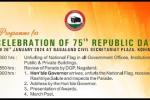

MIU & TSOKUM - KHIAMNIUNGAN TRIBE
- Miu
-
This festival is held in the first week of May every year.One of the main significance of this festival is to build cordial relationsand to forge close-knit relations between the maternal uncle and his sister's off springs i.e., nephews and nieces. It is during this festival that the maternal uncle offers a very special prayer by invoking the supernatural Deityto grant good health, prosperous life and power over enemy to his nephews and nieces.
On this occasion, nieces and nephews visit their Maternal Uncle with gifts such as Clothes, Dao’s and other things besides food items like fermented brews, sticky rice and cooked or uncooked meat. This is also a very special occasion of FORGIVE and FORGET between Maternal Uncle and his nieces or nephews. But if the difference or dispute is beyond pardonable on the part of Maternal Uncle, he will not allow his nieces and nephews to visit his house for getting blessing. In the event of such happenings it is believed thatthe future life of his nieces and nephews will lay in shambles. But refusing togive blessing is a very rare case.
The significance of this festival is also to mark the seedling in the new field in which all the families of the village go to the infield sand perform rituals and prayer by offering animal blood and flesh with other food stuff to their Deity. The people also pray to bless them with strong,handsome and beautiful children. They too pray for increase of animals and grains in the field and ask for prevention of crops from damage and visitation of plague over human and animals.
This festival is also known as dividing line between merrymaking season and the start of working season. From this festival onward people stop performing folk songs and dances till the next joyous festival called 'TSOKUM' comes. The elders of the tribe and also the villages stop to enter into any treaty or hold any diplomatic welfare ties with any tribe and villages.
- Tsokum
-
This festival is held during the first week of October. This is mainly observed to give thanks to the Almighty Deity forgiving good crops and safeguarding lives in the family.During this festival animal like mithun, buffaloes, cows, pigs etc. are killed and sacrificed to appease their God. A portion of neck and limbs of the animal skilled is then collected in the 'Morung' in the form of compulsory donation.The next day all the male folks of the village go to make or repair the road sand bridges between the villages and also the roads leading to their fields. On their return home from work, they partake of the food and brews that have been kept arranged by the villagers out of the meat, donated by those who killed animals during the festival.
One of the main significance of this festival is to grant permission of right to harvest and test the new crops. It is also during this time that each warrior of the village is in a liberty to display his hunted trophies by marking on the sharpened wood so that the people will come to know how many men he has killed during his life time.






